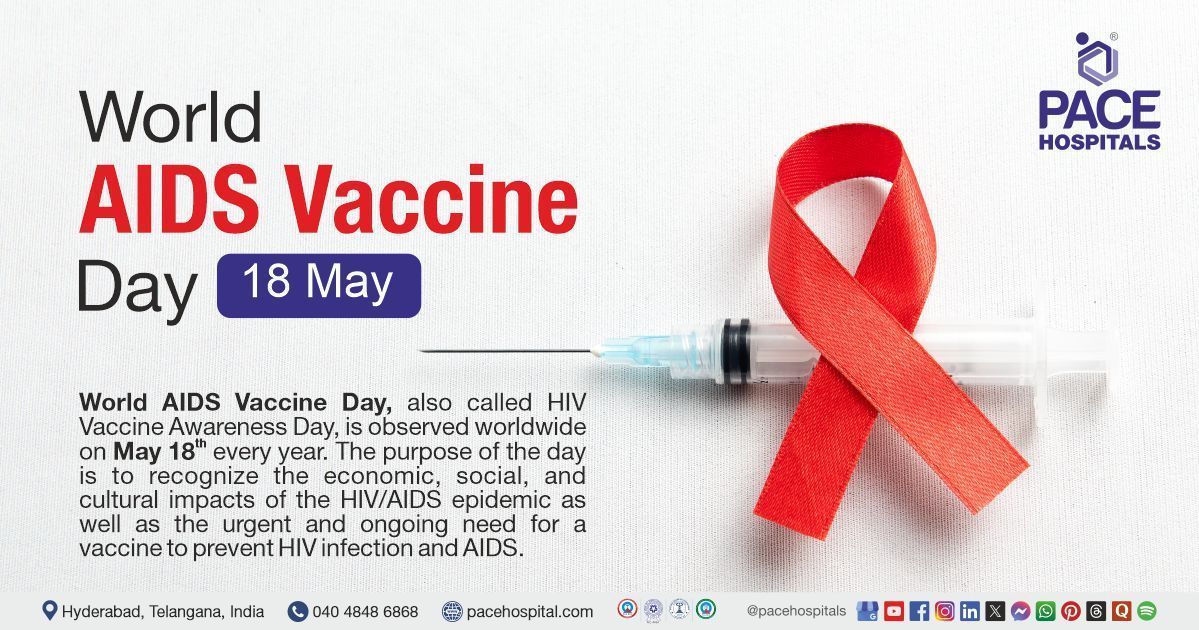World AIDS Vaccine Day 18 May 2025 | History, & Importance
PACE Hospitals
World AIDS Vaccine Day, also called HIV Vaccine Awareness Day, is observed worldwide on May 18 every year. The purpose of the day is to recognise the economic, social, and cultural impacts of the HIV/AIDS epidemic as well as the urgent and ongoing need for a vaccine to prevent HIV infection and AIDS.
It also honours and expresses gratitude to the thousands of scientists, medical professionals, community members, and volunteers who make an endless effort to create a safe and effective AIDS vaccine and to eradicate the stigma associated with HIV/AIDS.
History of World AIDS Vaccine Day
The day began on May 18, 1997, when U.S. President Bill Clinton gave a crucial speech at Morgan State University. Bill Clinton highlighted the urgent need for a preventive HIV vaccine in this speech, saying, "Only a truly effective, preventive HIV vaccine can limit and eventually eliminate the threat of AIDS." He advised the world's scientific community to aim for the development of an AIDS vaccine in the upcoming ten years.
The first World AIDS Vaccine Day was celebrated on May 18, 1998, to mark the anniversary of Clinton's speech and to draw attention to the continued efforts and necessity for an HIV vaccine. Since then, the day has become a yearly reminder of how important a vaccine would be in putting an end to the HIV/AIDS pandemic and has evolved into an opportunity for:
- Increasing public awareness of the significance of HIV vaccine research.
- Honouring the efforts of advocates, volunteers, medical professionals, and scientists who are working on a vaccine.
- Educating people about preventing HIV and the difficulties in developing a vaccine.
Every year, communities and organizations around the world remember the day with advocacy campaigns, educational activities, and projects aimed at promoting worldwide collaboration and funding for vaccine research. The observance emphasizes that a vaccine is still necessary to eventually control and end the HIV/AIDS epidemic, even in the face of advancements in treatment and prevention
Importance of World AIDS Vaccine Day
An important milestone in the global fight against HIV/AIDS is World AIDS Vaccine Day, which is celebrated on May 18 every year. Some of its main purposes are:
- Raising awareness: The purpose of the day is to raise public awareness of the ongoing HIV/AIDS epidemic and the immediate need for a vaccine to prevent it. It draws attention to the most recent advancements and ongoing difficulties in vaccine research, encouraging increased public awareness and participation.
- Honoring efforts and progress: World AIDS Vaccine Day honours and marks the commitment of researchers, scientists, medical professionals, volunteers, and advocates who work tirelessly in endless efforts to create a safe and effective HIV vaccine. Addressing one of the most important public health issues in the world requires innovation and resilience.
- Advocating for investment: The day provides an opportunity to call for increased funding and resources to be allocated to HIV vaccine research and development. Despite advancements, increased and consistent funding from the public and private sectors is required to promote the development of a vaccine.
- Promoting equity: World AIDS Vaccine Day emphasizes the necessity of providing all populations, particularly the most vulnerable and those disproportionately impacted by HIV/AIDS, with equitable access to any future HIV vaccine.
- Inspiring hope and renewed commitment: People all across the world reaffirm their dedication to putting an end to the HIV/AIDS pandemic by honoring this day. It gives hope to the millions affected and serves as a reminder that, despite continued obstacles, scientific advancement and group efforts can lead to a future that is free of AIDS.
- Educational initiatives: Campaigns and activities are held to raise awareness of HIV prevention, the advantages of vaccination, and the crucial role a vaccine would play in eventually controlling and eradicating the epidemic.
Current State of HIV Vaccine Research
With several strategies being studied, researchers are making progress in the development of an HIV vaccine:
- Broadly Neutralizing Antibodies (bNAbs): By promoting these antibodies, vaccines can prevent various HIV strains from infecting immune cells.
- T Cell Immunity: To identify and manage HIV infection, some candidates prioritize generating strong T cell responses.
- mRNA Platforms: The goal of mRNA-based HIV vaccine trials, which build on COVID-19 vaccine technology, is to empower the immune system to recognize HIV proteins.
- Mosaic Immunogens: These stimulate widespread immune responses by using protein fragments from several HIV variants.
Global Impact and Ongoing Need
With almost 40 million people living with HIV globally and over a million new infections each year, HIV remains a significant global health concern despite improvements in antiretroviral therapy (ART) and prevention. The widespread, long-lasting protection required to put an end to the epidemic can only be provided by a vaccine.
Share on
Request an appointment
Fill in the appointment form or call us instantly to book a confirmed appointment with our super specialist at 04048486868
Appointment request - health articles
Recent Articles











